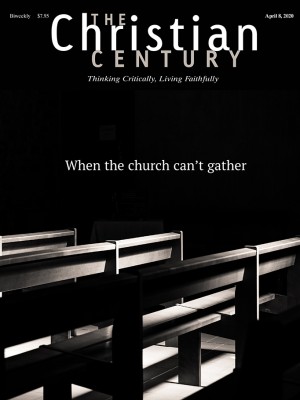April 12, Easter Day (Acts 10:34–43; Psalm 118:1–2, 14–24; Matthew 28:1–10)
What kind of faith gets you through 25 years in a refugee camp?
The choir director at the church where I serve has unusual credentials. She used to lead a large choir in the Nyarugusu refugee camp in Tanzania. She grew up there herself: her extended family fled from violence in the Democratic Republic of the Congo and then spent almost 25 years in Tanzania before resettlement in San Diego in 2016. I met Matrida that fall, when she arrived at St. Luke’s with her two young children and her voice that moves worshipers to tears, whether or not they understand Swahili or Kibembe.
Matrida also leads a band, which recently held a Congolese gospel concert at the church on a Saturday night. The diverse audience cheered as the dancers moved in unison, and my own voice rose unbridled when her nine-year-old son temporarily took center stage. It was a victory cry—let’s just say he hasn’t received a lot of positive attention at school since his US arrival.
Read our latest issue or browse back issues.
The next day, a white congregant in his seventies said he couldn’t stop wondering about the concert: What kind of faith gets you through 25 years in a refugee camp singing God’s praises? What kind of faith has you dancing and writing new songs about Jesus as you pick flowers and paint ships to try to make rent? What kind of faith is this?
Nearly 2,000 years down the line, we still struggle to absorb the breadth of God’s Eastertide movement. Despite Peter’s astonished declaration in Acts 10—“I truly understand that God shows no partiality, but in every nation anyone who fears him and does what is right is acceptable to him”—and our hearty intellectual assent to the same, we still seem to need our own Acts 10 moments. We need to be surprised again by God’s presence in unexpected places.
Peter’s wonder that gentiles could be accepted by God in Christ without adopting Jewish practices is worth trying to translate. This is the pivotal awakening to a church that is for every nation. The repercussions of the Acts 10 moment, and the insistent advocacy of Paul, give birth to Christianity as a faith where you do not have to become someone you are not—ethnically, culturally, or linguistically—to be at peace with the God known first by the people of Israel. Because homogenous churches remain the norm, this can be as shocking today as it was in the first century.
Do we “truly understand” that God shows no partiality, that everyone who trusts in Jesus receives the peace of forgiveness and might join in the victory song of God’s Easter people?
“I shall not die,” says the psalmist, “but I shall live, and recount the deeds of the Lord!” Each song Matrida’s band offered could be heard as a variation on the themes of Psalm 118, with a special affection for Jesus as the name of the one who has opened the gates of righteousness. They varied from the day-to-day theology of “Mwokozi wetuanatupa furaha dumia” (Our Savior gives us joy on earth) to the sweetly imaginative image of dancing with Jesus in heaven expressed by “Mimina Yesu sitamuacha” (Jesus and me). Do we who are white Americans, ashamed of our ancestors’ colonial sins, understand how this could be? Maybe we don’t, and it’s time we acknowledge our own ignorance and provinciality. Or maybe we simply need to be reminded that the resurrection bears good news to us, whoever we are, but it never belongs to us.
To celebrate Easter is to celebrate a new epoch of history in relationship to God, not just an event that gives hope for a new day in our lives (though it can do that, too). If our vision is getting nearsighted, we need to listen again as the angel in Matthew’s Gospel account foreshadows this expansive dynamism of the Easter faith: “Go quickly and tell his disciples, ‘He has been raised from the dead, and indeed he is going ahead of you to Galilee; there you will see him’” (Matthew 28:7). We must try to catch up and witness what God is doing in Christ, “alive and at large in the world.”
That’s a phrase from poet John Masefield: God’s ongoing work in Christ is never comatose or captive, neither to local geographies nor to the hidden fences of human expectations. I tend to want the kingdom of God to be develop in a tidy, linear fashion. If I can’t detect change, I begin to doubt the architectural plans and progress of the one who laid the chief cornerstone. I’m always looking for God outside Jerusalem, or wherever I saw him last. Why isn’t the risen one showing up for the implicit work I assigned? To hear again, through Peter’s own surprise, that the Spirit of Jesus is “at large” is to know and trust that he is always active—and that we too must remain on the move.
As we try, stumbling, to go where the angels or visions or dreams or Christ himself tells us, we may indeed encounter him, often unexpectedly. This is the smile-worthy back and forth of this Gospel story. “He is going ahead of you,” says the angel, so Mary and Mary run to tell the disciples. But then—surprise!—Jesus meets them on the way with a sunny “Greetings!” They fall down to worship him, and Jesus offers words of comfort and courage: “Do not be afraid.” But then: come now, let’s keep moving. “Go, and tell my brothers to go . . .”
Jesus is on the move, and the Easter epoch of reconciliation is unfolding in ways we cannot understand—but might occasionally be privileged to witness.





